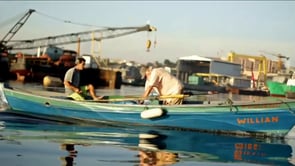 Our research for the Rio situation began with the issue of water quality in Guanabara Bay: world attention is turning to Rio de Janeiro and its waters as the Olympic Games draw closer. However, the pollution of Guanabara Bay isn’t a new problem, and its impact is much greater than a one-off sports event. Many communities’ livelihoods are based on and around the bay, and of course all life is dependent on clean water.
Our research for the Rio situation began with the issue of water quality in Guanabara Bay: world attention is turning to Rio de Janeiro and its waters as the Olympic Games draw closer. However, the pollution of Guanabara Bay isn’t a new problem, and its impact is much greater than a one-off sports event. Many communities’ livelihoods are based on and around the bay, and of course all life is dependent on clean water.
This short documentary (14.24m, directed by Rafael Bacelar and Rodolfo Gomes) shows a day in the life of local fisherman, whose lifestyle and livelihood is threatened by pollution, industrialisation and water traffic. It’s in Portuguese, but it’s not difficult to understand what is being said; the cinematography clearly contrasts nature’s beauty with the intruding industry, and demonstrates the environmental destruction and loss of a way of life.
In 2012, a group of activists, journalists and researchers toured a number of sites in and around Rio de Janiero to learn about some of the worst polluters. The tour has been documented on the site Rio+Toxico, which provides information in English as well as Portuguese about these companies. One is the German company Thyssenkrupp Atlantic Steel Company, one of the world’s largest steel producers; its operation in Santa Cruz, Rio de Janiero, generates massive pollution, creates few jobs and doesn’t pay tax. Even worse, in 2012 TKSCA wass suing researchers and scientists who are evaluating and publicising the environmental damage being done by the company. Conversely, TKSCA was sued by the state of Rio de Janiero for environmental crimes.
The site also documents action taken by locals to protest against environmental damage and lack of consultation, and the metropolitan landfill Jardim Gramacho, the largest landfill in Latin America (it was closed in 2012).
The Rio+Tóxico project demonstrates the “David and Goliath” situation of small groups of activists trying desperately to protect the environment and ordinary people’s lives in the face of huge multinational corporations whose only interest is profit. This is the larger landscape in which the 2016 Olympic Games will take place.